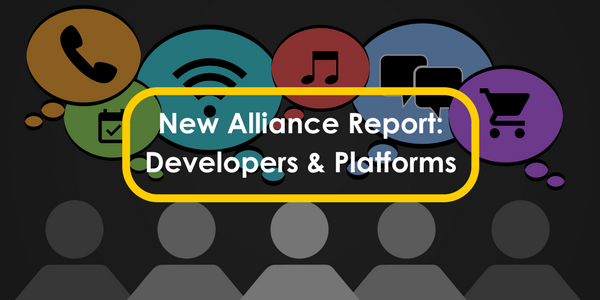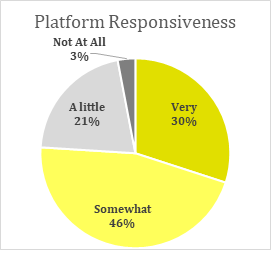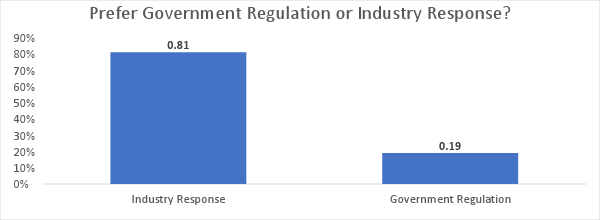In May 2017, the European Commission announced their intention to introduce new legislation to govern the relationship between platforms and businesses. In order to investigate that relationship and gain a more robust understanding on the need for regulatory intervention, the Developers Alliance carried out a survey of over 110 European-based developers and publishers to collect their experiences.
Building upon the Developer Alliance’s previous research report in Fall 2016, Report on Competition in the Mobile App Ecosystem, and the follow-up in June 2017, The Mobile App Ecosystem Remains Stable and Competitive, the survey found that developers have an overwhelmingly positive attitude towards platforms and believe that the relationship between them and platforms is best handled within the industry, rather than through government intervention.
A large majority (85%) of developers view platforms as either partners who are crucial to their success (38%) or effective tools that enable growth (47%). These positive reactions reflect that developers enter into relationships with platforms willingly and expectantly, not reluctantly or timidly. They know what they want, and what to expect from platforms. Platforms are seen as both conducive towards their success and responsive to their needs.
The survey results also show that platforms do their best to service their users and help them grow.
That is not to say developers do not face challenges; however, those challenges are not due to platforms misbehaving or any conflict between publishers and platforms. It’s a byproduct of a constantly changing industry where best practices are constantly being rewritten and rendered obsolete as technology evolves. In such an environment, the only path to success for platforms and publishers alike is to work with one another. That can only happen if platforms are responsive, and those who work with platforms think that they are.
In our conversations with developers and publishers for this report, the theme that stood out the most was transparency and the need for improved communication. Many developers explicitly stated this, particularly when it comes to reporting bugs or fixing Application Programming Interface (API) compatibility issues. Clearer and better explained guidelines would help mitigate those and other issues; for example, the app store review process.
Developers can face challenges if their app or an update is submitted to the app store and is held up in review. This seems to be a problem mostly exclusive to the Apple app store, which services devices that run on the iOS operating system. In short, Apple has a higher barrier than other app stores for what products are available in their app store. This process has trade-offs: they can guarantee a certain level of quality, security, and interoperability to their users as a result of their quality assurance and review process.
While Apple publishes its guidelines for review, there can still exist confusion and uncertainty, or developers may be operating under a previous guideline that has changed. In any case, this is an area that is seeing continuous improvement. Platforms are genuinely responsive and collaborate with their clients to to serve them better.
For these reasons, the large majority of the developers and publishers we surveyed believes that the relationship between them and platforms is best handled within the industry, rather than through government intervention. There exists a real threat of unintended consequences and massive disruption from undue legislation.
Unnecessary legislation can cause disruption by freezing in place a best practice at – or behind – the current level of technology or by inducing unintended product delays and additional costs. While many publishing firms – and the developers who work for them – can shrug off these costs as the price of doing business, many smaller businesses and start-ups have much lower margins and much shorter runways. This has an even more insidious side effect of creating more uncertainty around newer companies, which discourages investment in small businesses and increases the gap between them and larger, more established companies.
For these reasons, in order to improve relations between platforms and publishers, we advocate for industry-led efforts to better equip developers with the knowledge they need to make prudent business decisions. Platforms, along with other players in this space, can do a better job of being transparent with the processes they set up when it comes to entering into business relationships while still protecting proprietary information.
The Developers Alliance will continue its efforts to help platforms generate best practices with a specific focus on communications and transparency. We encourage the European Commission to do the same, not through the heavy hand of legislation – which few in the mobile app industry want – but through listening to developers and helping report their specific issues to platforms.
Read the full report here.
MICHELA PALLADINO
Director, European Policy & Government Relations







